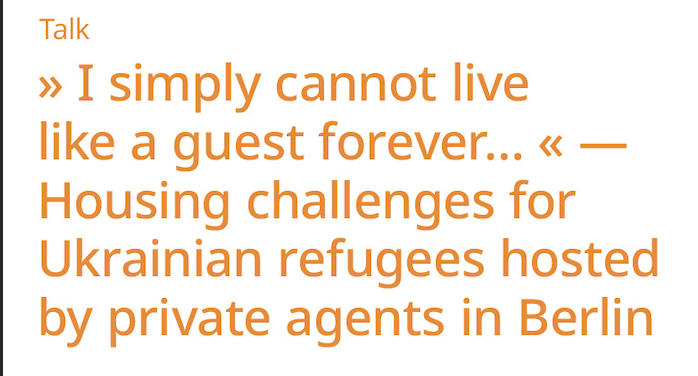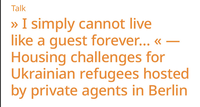
10YBIM Lecture Series #05: Housing challenges for Ukrainian refugees in Berlin
„I simply cannot live like a guest forever …“ – Housing challenges for Ukrainian refugees hosted by private agents in Berlin. Talk with Valeria Lazarenko, Humboldt-Universität zu Berlin. / „Ich kann nicht ewig wie ein Gast leben ..." – Herausforderungen bei der Unterbringung von ukrainischen Flüchtlingen über privatenVermittlern in Berlin. Talk mit Valeria Lazarenko, Humboldt-Universität zu Berlin.
INFO
10YBIM Lecture Series #05:
Talk mit Valeria Lazarenko, Humboldt-Universität zu Berlin (English)
Monday, 27, November 2023
6:00-8:00 p.m.
Institut für Europäische Ethnologie
Møhrenstr. 40/41
10117 Berlin
Room 408
Free entrance
BACKGROUND
Since the beginning of the Russian war of aggression against Ukraine, more than 8 million Ukrainians have migrated abroad. From them, more than a million received protection in Germany. Even though the arrival and settling of refugees was governed on both state and municipal levels, ground and personal initiatives contributed significantly to accommodating those fleeing the war. The option of private housing, when people in receiving countries willingly offered their homes for refugees, helped to settle the vast majority of those arriving. However, given the temporal context of the ongoing war and unclear perspectives on how long the refugees will stay, or whether they would return to their country, the overall idea of private housing was challenged. Even though the German government has adopted a decree for compensating the costs of hosting Ukrainians, cases were reported when refugees were asked to move out, resulting in some of them making the decision on returning back to Ukraine. Everyday conflicts, misunderstandings, and exposure to potential exploitation resulting from tensions in private households can also further contribute to the well-being of the refugees and their prospects of staying in the receiving country. Such challenges might be a clear manifestation of what is called “compassion fatigue” and represent the overall contestation of the private housing model, which can work as an interim rather than a sustainable solution towards Ukrainian refugees will be highlighted as well.
Drawing upon the ongoing anthropological research on the personal experiences of Ukrainian refugee women in Berlin, the talk will focus on the impact of private housing contestations on the refugees’ decision-making and return perspectives. The overlapping housing crises in Berlin and the ambiguities of German social policies towards Ukrainian refugees will be highlighted as well.
* * *

